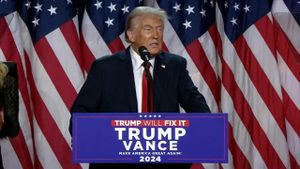Walmart, the retail giant renowned for its expansive reach across the United States, is making headlines yet again. This time, the story revolves around the company's recent decision to roll back its diversity, equity, and inclusion (DEI) initiatives. This is no small feat, as it reflects broader trends among major corporations reevaluing their DEI policies amid mounting pressure from conservative activists and shifting political landscapes.
During a recent interview with CBS News, Walmart U.S. CEO John Furner asserted, "We've been on a voyage and we are not perfect." This candid acknowledgment strikes at the core of Walmart's recognition of its changing priorities and aims to reflect those changes proactively. Furner elaborated, stating, "What we're trying to do is to make sure every customer, every associate feels like they belong here to shop." This statement sets the stage for significant modifications to Walmart's approach to diversity and inclusion.
According to reports, this rollback includes significant alterations such as discontinuing the funding of its Center for Racial Equity, which was established only three years ago following the police killing of George Floyd. Notably, the company will also phase out the use of the term "DEI" and will no longer provide prioritization to suppliers based on their race or gender. Furner remarked, "We’re going to continue to make the best decisions we can... so everyone feels at home here." This aims to encourage both customers and employees to feel they are welcome inside Walmart—and feel like they truly belong.
The growing trend to rollback DEI initiatives among corporations has not gone unnoticed. Recent corporate shifts include changes adopted recently by Ford, Lowe's, and Harley-Davidson. These transitions coincide with heightened pressure stemming from various conservative groups advocating for less emphasis on identity politics within corporate structures.
An important marker in this debate was the U.S. Supreme Court's June 2023 ruling, which effectively ended affirmative action policies for college admissions. This judicial decision provided momentum for those opposing corporate DEI strategies, prompting companies like Walmart to reassess their commitments. Furner’s comments reflect this impact, as he indicated, "We all continue to be on this path together." This connection points to the growing scrutiny businesses face on their social responsibility practices from both their customers and politically motivated groups.
Walmart's decision to halt the prioritization of certain suppliers reflects its realignment with the desires of certain consumer bases. Furner implied the company's upcoming strategies would prioritize the success of small suppliers, providing them pathways to thrive and drive business. He noted, "We’ll keep doing what we can to help small suppliers succeed," highlighting Walmart's continued commitment to nurturing these relationships. This shift suggests Walmart is putting its focus on locality and small business empowerment rather than corporate diversity initiatives.
Furner's remarks also brought attention to the company's inventory policies, which will see Walmart discontinue listings of certain products related to transgender themes, especially those marketed toward children. "We want to make sure we have the right environment for children, and we're regularly reviewing what we present on our platform," Furner clarified. This decision once again seems rooted in responding to growing concerns and sentiments from certain customer sectors against what they view as overreach of corporate social policies.
Historically, various companies have faced backlash from conservative groups for their perceived commitment to "woke" culture. Brands like Bud Light, Target, and Disney have all recently navigated difficult waters as consumer opinions were heavily voiced through boycotts. Such corporate blowback underlines the tension surrounding DEI initiatives—especially when they become embroiled in wider cultural debates over identity and progressivism.
Walmart's announcement gives insight not only to its internal policy realignments but also to the larger narrative at play among major corporations managing their public relations amid sociopolitical changes. With each move made by industry titans like Walmart, the trajectories of business practices become intertwined with public sentiment, demonstrating the powerful voice consumers wield today.
Another significant aspect of this shift tarnishes the legacy of DEI programs, emphasizing the political climate surrounding their implementation. The campaign bench against corporate diversity pushes back against years of efforts for more inclusive environments, advocating for what they perceive as common sense over corporate responsibility. Furner stated, "We are re-assessing our commitments to make sure we align with the values of our communities." These sentiments echo sentiments elsewhere as even traditional figures laud these transformations as the onset of common sense returning to corporate America.
A draw from consumer sentiment directly influences these corporate strategies. Organizations pivoting back from DEI policies show awareness and willingness to align closely with their consumer base, but it also raises the question of effectiveness. While some argue for greater inclusivity, others insist upon maintaining tradition and uniformity as primary drivers of business success.
Looking back, Walmart established its Center for Racial Equity as part of its response to the social climate following George Floyd's death. The decision to dismantle such initiatives underlines significant changes to the retail strategy and will resonate within the organization for years to come. Furner has reiterated the earnestness of this decision, though it may signal departure from previous commitments.
Even as the fast-paced corporate world adapts to politically charged atmospheres, the essence of belonging—highlighted by Furner—stands as Walmart's guiding light. The above shifts bring clarity to just how companies are recalibrated under the current socio-political climate, with Furner underscoring the store's commitment to retaining America at heart: "We're dedicated to ensuring every customer feels they belong here."
Major corporations, such as Walmart, find themselves balancing profitability with social accountability, often leading to the complex dance of corporate social responsibility. The path taken now defines the tone for how corporate America grapples with identity, diversity, and inclusivity moving forward.
Whether Walmart's movement marks the end of corporate DEI implementation remains to be seen, but it certainly leaves an indelible mark on the fabric of corporate America. Regardless of what the future holds, consumers, activists, and shareholders alike will watch closely as these corporate giants redefine what it means to be inclusive.
It's important to evaluate and rethink the rigorous steps taken across society, and as companies like Walmart highlight shifting views, it might just indicate the desire for re-establishing certain corporate values grounded upon tradition—aligning those values with expectations of the American consumer.
Indeed, this evolution of policy reflects the dynamic tensions present within the modern corporate environment. Who truly belongs, who should be prioritized, and what diversity looks like are questions at the forefront as Walmart and other corporations transition to this new normal. All eyes remain fixed on how the retail titan navigates these waters moving forward.
Walmart's posture on DEI policies may exhibit the growing influence of conservative activism within corporate walls, echoing the sentiments of many across the political spectrum. This contentious environment promotes more nuanced conversations surrounding inclusivity, signaling the redefinition of corporate America’s relationships with its clienteles.
With the specter of ever-changing legislative environments and consumer preference driving corporate strategies, it will be fascinating to observe how Walmart plans to sculpt its narrative—fostering belonging, dependability, and shared purpose within its expansive communities and stores. The recent alterations hint at more significant changes beyond the storefront, urging questions about the political dynamics shaping corporate practices for years to come.



